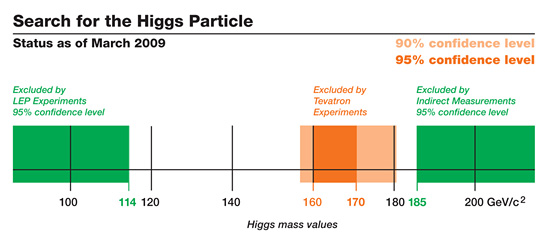 Fermilab is still hunting the Higgs boson.Fermilab
Fermilab is still hunting the Higgs boson.FermilabPosted on 03/13/2009 10:04:07 PM PDT by neverdem
Longer search promised after physicists exclude heavy masses for the 'God particle'.
The Higgs boson particle may be lighter — and the race to find it tougher — than particle physicists had hoped, according to the latest results from the Tevatron particle accelerator at the Fermi National Accelerator Laboratory in Batavia, Illinois.
 Fermilab is still hunting the Higgs boson.Fermilab
Fermilab is still hunting the Higgs boson.FermilabOn 13 March, scientists there announced that they had ruled out a crucial part of the hunting ground for the 'God particle', thought to confer mass on all other matter.
The results suggest that the Higgs boson is not a relatively high-mass particle, and physicists must keep looking for evidence of the Higgs boson in the lower-mass debris that sprays from particle collisions inside the Tevatron.
This means that scientists at the Large Hadron Collider (LHC) at CERN, Europe's particle-physics laboratory near Geneva, Switzerland, won't have a quick route to success. The LHC was designed to collide particles with five times the energy of the Tevatron, and would have excelled at hunting for a high-mass Higgs particle.
"If the Higgs existed at one of those high masses, then they could have anticipated discovering it very quickly," says Darien Wood, a particle physicist at Northeastern University in Boston, Massachusetts, and spokesman for DZero, one of the two main Tevatron experiments. The results are based on all data collected since 2001 by DZero and its sister experiment, the Collider Detector at Fermilab (CDF), which study the debris from proton-antiproton collisions.
Lyn Evans, project leader at the LHC — which is being repaired after it was damaged during start-up tests in September 2008 — says the high-mass regime was the "obvious" place for both the LHC and Tevatron to make headway. That's because there are fewer debris particles with such high energies, making it easier to sift through the data looking for a trace of the Higgs particle.
"The fact that they've excluded the Higgs in this band is going to make it harder for everyone," says Evans.
The Tevatron results specify that the Higgs boson is very unlikely to have an energy between 160 and 170 gigaelectronvolts (GeV). Gigaelectronvolts are a measure of a particle's energy that is proportional to its mass.
Experimentalists have been working on the assumption that the Higgs boson lies somewhere between 114 and 185 GeV. The lower-energy boundary was established by the Large Electron-Positron (LEP) collider at CERN in the 1990s, whereas the upper boundary is a softer limit established by indirect evidence, such as the masses of the top quark and the W boson.
The latest results, and other evidence, suggest that the Higgs boson is hiding at the lower end of this energy scale. But at lower energies, the job of filtering out other debris and finding a rare Higgs event becomes more difficult. Even if the Tevatron runs through 2011 — not yet planned for in year-to-year US budgets — it would only have about a 30% chance of finding evidence for a low-mass Higgs, according to Fermilab talks presented in February at the American Association for the Advancement of Science conference in Chicago, Illinois.
Finding 'evidence' for something, in particle-physics jargon, is a long way from 'discovering' something. The LHC, if it starts operating at the end of this year, should quickly catch up and surpass the amount of data gathered by the Tevatron, giving it a better shot at making a true 'discovery' - with a confidence level of 99.9999%.
There is also the possibility that the Tevatron and the LHC will exclude the Higgs boson across the entire range of expected energies. It may exist at energies higher than 185 GeV, a region that only the LHC can explore. Or it may not exist at all.
Either way, theorists would have to go back to the drawing board and start tweaking the standard model of particle physics, which, along with predicting the Higgs, explains the behaviour of three out of the Universe's four fundamental forces.
And although narrowing the Higgs hunting grounds is important, says Robert Roser, spokesman for the CDF experiment, "we'd rather find it, not exclude it".
Strange behavior at a distance or something. Do you think they will find it?
 on the Fermi page http://www.fnal.gov/ excludes with 95 % certainty the range 160 to 170 GeV/c². The question is if it is in the lower interval i.e. 114 - 160 or in the higher interval, 170-185. If it is in the lower range it can be found by the Tevatron at Fermilab, otherwise we have to wait for the LHC.
on the Fermi page http://www.fnal.gov/ excludes with 95 % certainty the range 160 to 170 GeV/c². The question is if it is in the lower interval i.e. 114 - 160 or in the higher interval, 170-185. If it is in the lower range it can be found by the Tevatron at Fermilab, otherwise we have to wait for the LHC.
I hope they find it. I still doubt it though...
Disclaimer: Opinions posted on Free Republic are those of the individual posters and do not necessarily represent the opinion of Free Republic or its management. All materials posted herein are protected by copyright law and the exemption for fair use of copyrighted works.